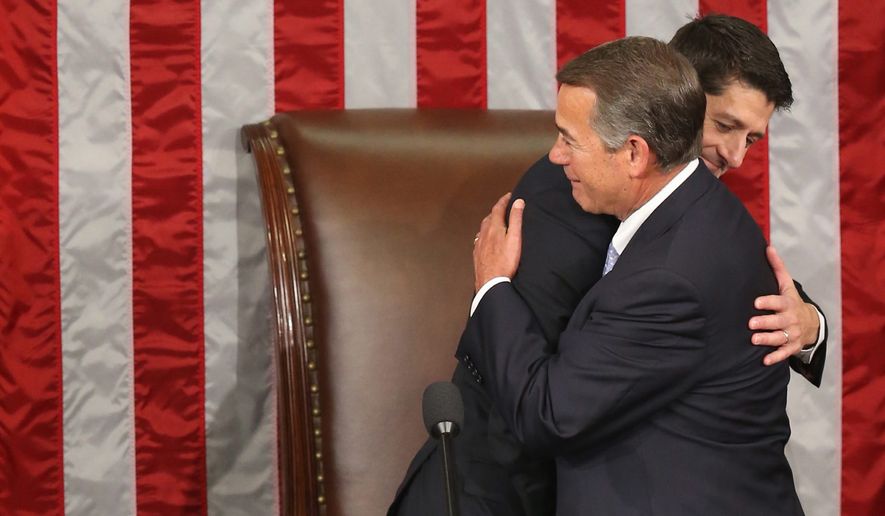In taking the speakership, Rep. Paul Ryan may have doomed his chances of being president.
The GOP’s 2012 vice presidential nominee had long been more interested in the White House, but on Thursday his colleagues at the other end of Pennsylvania Avenue gave him the top job in Congress.
Running the chaotic House is lonely and trying — and for nearly two centuries has proved to be a poor springboard for those who see themselves as presidential material.
“I think he recognizes that,” Rep. John A. Boehner, who turned over the speaker’s gavel to Mr. Ryan, told reporters on Wednesday. “Not since [James] Polk has anybody left this office and become president.”
But his backers, ranging from aides to lawmakers, say if anyone can do it, it will be Mr. Ryan, who at 45 is the youngest speaker in nearly 150 years and who has already broken the mold by taking an unusual path to the speaker’s job.
“That’s conventional wisdom, but these aren’t conventional times,” said Rep. Doug LaMalfa, California Republican.
SEE ALSO: Paul Ryan elected speaker of the House, youngest in 150 years
The good feeling toward the Wisconsin Republican crosses party lines. Though Democrats were clear that they weren’t going to back him for president, they said he’s not putting a capstone on his political career by taking the speaker’s post.
“This is an opportunity for Paul Ryan to advance his career, if he is a principled speaker,” said Rep. G.K. Butterfield, North Carolina Democrat, who praised the bipartisan tone of Mr. Ryan’s address to the House as he assumed the speakership Thursday morning.
Mr. Ryan had repeatedly rejected entreaties to consider being speaker, saying he would rather run for and serve as president because it’s easier on someone with a young family. The speaker is expected to travel constantly to recruit candidates and raise money, while the president is often a virtual prisoner of the White House, but making it to dinner with his family requires a one-minute walk.
But after Mr. Boehner announced his retirement and heir-apparent Majority Leader Kevin McCarthy’s bid faltered, Mr. Ryan was begged to run, as colleagues called him the only possible unifying candidate.
Being speaker means having to referee disputes between wings of the party, which makes it what Mr. Boehner called a lonely job. It also means having to strike the bipartisan deals that anger the very political base voters who are needed to win presidential nominations.
Mr. Boehner said he never had his eye on the White House — “Stick me in the eye with a dull stick. I’ve never been afflicted with that disease” — but one of his recent GOP predecessors, former Speaker Newt Gingrich, did try, running for the party’s nomination in 2012. He lost to former Massachusetts Gov. Mitt Romney.
SEE ALSO: John Boehner bids farewell to House as ‘regular guy’ speaker
President Ford, meanwhile, had been on the path to becoming speaker, serving for a quarter century in the House and rising to be Republicans’ floor leader — but his goal of the top House job was derailed when President Nixon tapped him to be vice president after incumbent Spiro Agnew’s resignation. Mr. Ford later ascended to the White House after Nixon’s own resignation.
Rep. Mark Sanford, South Carolina Republican, said given the conventional wisdom about speakers’ political prospects, it makes Mr. Ryan’s willingness to accept the speaker’s job all the more amazing. Still, Mr. Sanford wasn’t ready to write off Mr. Ryan’s chances.
“That conventional wisdom could be broken because of his age,” the congressman said. “There is a lot of runway ahead of him in terms of career and politics.”
• Stephen Dinan can be reached at sdinan@washingtontimes.com.
• S.A. Miller can be reached at smiller@washingtontimes.com.




Please read our comment policy before commenting.